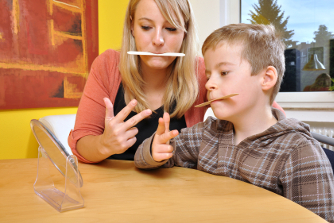Speech-language pathology for children: from Indian to chief
Language means communication. And communication already starts on the day of birth. Step by step, non-verbal communication becomes individual articulation. During the linguistic development children go through several periods – some faster and some more slowly than others. If there is no development at all, the reason can be a speech development disorder or a speech development delay. This can be overcome playfully by applying voice therapy. If children have good linguistic skills, it also has a positive impact on their achievements in school – as a side effect the children’s self confidence is improved.

For children we offer treatments
for the following disorders:
- Stuttering
- Cluttering
- Linguistic development disorders
- Auditory detection and processing disorder
- Dyslalia
- Dysgrammatism
- Dyspraxia
- Auditory disorder
- Voice disorder
- Myofunctional Disorder
- Dyslexia (Reading and writing disorder)

Early symptoms
Does your child mix up sounds, mispronounce sounds or the combination of sounds, avoids certain words or talks just a little? Is your child not able to maintain eye contact while speaking or starts talking at a later point of time than other children do? Please consult your pediatrician or visit a speech-language pathologist.
Having fun while speaking
For children a visit at the speech-language pathologist’s office appears to be an hour of playing, which they should and want to continue with their parents at home. In a playful manner they discover step by step how joyful it could be to speak clearly – and they will also benefit from this in their future development.
Procedure
Speech-language pathology is considered to be a remedy and, therefore, the therapy is paid by national health insurance companies. Patients only need a referral from the doctor. For children co-payment is not required. The speech-language pathologist can begin with the treatment after the patient visited the doctor. The first step is an anamnesis report and a diagnosis, followed by an individual therapy.



